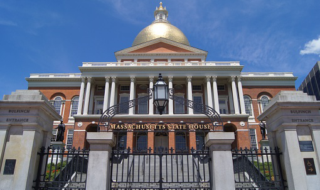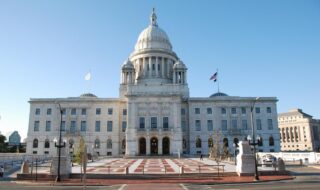February 23, 2024 Last Edit: July 19, 2024
NFIB helps defeat bills harming PEOs, general construction contractors as March 10 adjournment date looms
State Director Anthony Smith reports from Salem on the small-business agenda for the legislative and political week ending February 23
February 22 was Day 18 of the 35-day 2024 Oregon Legislative Session, and that means we are officially past the half-way point, with the Legislature’s self-imposed deadlines kicking in left and right from now until adjournment, which must occur no later than Sunday, March 10.
Monday, February 19 marked one of those important bill deadlines. Bills assigned to policy committees in their chamber of origin were required to pass out of committee and make their way to the chamber floor, a budget committee, a revenue committee, or any joint committee by this deadline. This is called the “First Chamber Work Session Deadline” (see the chart below for more information).
Dead Bills
Many of the nearly 300 bills introduced this year are still alive, but there are several notable dead bills that NFIB either supported or opposed. These bills did not move out of committee prior to the first chamber bill deadline:
- HB 4005 – Professional Employer Organization (PEO) Restrictions NFIB Position: Opposed PEOs are “administrative employers” that partner with small businesses to provide payroll, human resources, and employee benefits services. At their core, PEOs give small businesses the administrative resources of large corporations and allow them to focus on their core products and services. HB 4005 would have effectively eliminated the PEO option for small businesses because the bill would have disallowed the “co-employment” model that PEOs need in order to give small businesses economies of scale on their insurance products. For more information, click here to view written testimony submitted by NFIB and the Oregon State Chamber of Commerce.
- HB 4050 – Pay Equity Fix NFIB Position: Supported This bipartisan bill would have added language (used by several other states with similar laws) to Oregon’s Equal Pay Law. The provisions would have given Oregon employers the flexibility they need to utilize incentives to recruit and retain their workforce by allowing for a pay differential so long as it does not discriminate based on a specified protected class, it is consistent with a business necessity, and it fulfills the underlying purpose of that business necessity. For more information, click here to view NFIB’s written testimony in support of HB 4050.
- SB 1573 – Contractor Wage Claim Liability NFIB Position: Opposed This bill would have made general construction contractors liable for the unpaid wages of their subcontractors. The bill would have fundamentally held the wrong party responsible for breaking the law. As mentioned in a prior report, the bill was briefly scheduled for a public hearing on the second day of session, but it was ultimately cancelled and not rescheduled before the first chamber bill deadlines. This bill is likely to return during the 2025 long session, and NFIB will be well prepared to defeat it again.
Live Bills
Bills stuck in their chamber of origin are still alive so long as they remain assigned to one of the Rules committees, one of the Revenue committees, or any joint committee (note that all budget committees are joint committees, meaning both senators and representatives serve on these committees.) Here are two bills NFIB is supporting – both are still alive:
- HB 4038 – Unemployment Insurance Tax Relief NFIB Position: Support | Rep. Boomer Wright (R-Coos Bay) is the chief sponsor of this measure, which seeks to provide targeted relief to Oregon small businesses who may have been negatively impacted by the temporary freeze on Unemployment Insurance experience ratings. HB 3389 passed in 2021 in response to the COVID-19 pandemic and prevented an automatic tax increase of $2.4 billion over the next several years. NFIB was in strong support of HB 3389, and it received near unanimous support in the Legislature. However, we always knew we would need to come back and fix the unintended consequences. HB 4038 does just that – and NFIB was glad to be able to testify in support during a public hearing on February 12.
- SB 1542 – Corporate Activity Tax (CAT) Relief NFIB Position: Support This bill would raise the current $1 million Corporate Activity Tax exemption to $5 million. Raising the exemption and filing threshold would exempt more than 70% of the businesses that currently pay the CAT, nearly all of which are small businesses. In a recent NFIB survey, more than 80% of respondents supported this change in policy. NFIB testified in strong support for the bill in a public hearing on February 12 and was joined by chief sponsors Sen. Lynn Findley, Sen. David Brock Smith, and Rep. Mark Owens. Also testifying in support were Rep. Anna Scharf, Rep. Lucetta Elmer, Rep. Christine Goodwin, and Rep. Ed Diehl.
Bills to Keep Watching
Not every bill starts off good or bad. Through the committee process, bills are amended, and for better or worse, that can change NFIB’s position on the bill. Several legislative measures have been introduced that we are currently monitoring. If they remain noncontroversial, we aren’t likely to weigh in. However, if there are opportunities to improve a bill to the point we would support it, or if something we oppose sneaks into a bill at the last minute, we’ll be prepared to act. Here are a few bills on the “watch list”:
- HB 4031 – Taxpayer Confidentiality Protections The release of taxpayer information through public records requests is prohibited by the federal government and by every state, including Oregon. Confidentiality of tax information is widely held to be a critical element of taxpayers’ willingness to provide information to taxing authorities and comply with tax laws. Tax records may also contain proprietary financial information related to business operations or markets which are considered closely held trade secrets. HB 4031 seeks to clarify in stature that disclosure of taxpayer information, including specific taxpayer names, specific taxpayer amounts, and individual tax(payer) returns, is prohibited at the state and local level in Oregon.
- HB 4034 – Federal Reconnect Tax Bill Oregon’s tax code connects to the federal tax code in two ways – we have a point-in-time connection that is outlined in statute for various tax programs, and we also have a “rolling” reconnect, which means that barring legislative action, Oregon automatically connects to the definition of federal taxable income. Occasionally, the United States Congress makes changes to how it defines federal taxable income. When that happens, Oregon can decide to do nothing (and accept the federal changes) or to disconnect (and reject those changes). No major federal legislation passed in 2023, or thus far in 2024, so at this point, we’re still looking at a “plain vanilla” reconnect bill.
- SB 1526 – Omnibus Tax Bill This bill is an omnibus bill, meaning it has many sections that have little in common with other sections in the bill, other than the fact that they are all related to tax law. Most of these sections clarify (or clean up) existing law or make changes to statute that are technical in nature. However, there are still opportunities to make policy changes in an omnibus bill, so we’ll be watching this one especially closely.
Check the webpage you’re on now for future legislative reports.
Previous Reports and Related Information
NFIB is a member-driven organization advocating on behalf of small and independent businesses nationwide.
Related Articles















